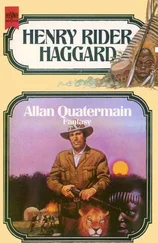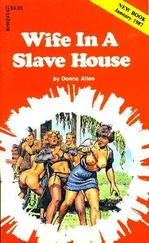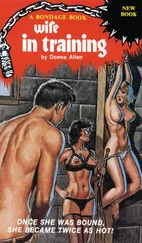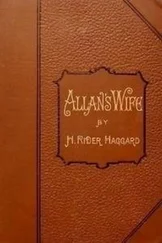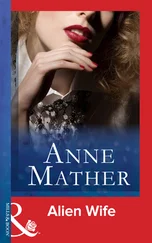H. Haggard - Allan's Wife
Здесь есть возможность читать онлайн «H. Haggard - Allan's Wife» — ознакомительный отрывок электронной книги совершенно бесплатно, а после прочтения отрывка купить полную версию. В некоторых случаях можно слушать аудио, скачать через торрент в формате fb2 и присутствует краткое содержание. Жанр: unrecognised, на английском языке. Описание произведения, (предисловие) а так же отзывы посетителей доступны на портале библиотеки ЛибКат.
- Название:Allan's Wife
- Автор:
- Жанр:
- Год:неизвестен
- ISBN:нет данных
- Рейтинг книги:3 / 5. Голосов: 1
-
Избранное:Добавить в избранное
- Отзывы:
-
Ваша оценка:
- 60
- 1
- 2
- 3
- 4
- 5
Allan's Wife: краткое содержание, описание и аннотация
Предлагаем к чтению аннотацию, описание, краткое содержание или предисловие (зависит от того, что написал сам автор книги «Allan's Wife»). Если вы не нашли необходимую информацию о книге — напишите в комментариях, мы постараемся отыскать её.
Allan's Wife — читать онлайн ознакомительный отрывок
Ниже представлен текст книги, разбитый по страницам. Система сохранения места последней прочитанной страницы, позволяет с удобством читать онлайн бесплатно книгу «Allan's Wife», без необходимости каждый раз заново искать на чём Вы остановились. Поставьте закладку, и сможете в любой момент перейти на страницу, на которой закончили чтение.
Интервал:
Закладка:
In those days civilization had not made any great progress in Southern Africa. My father went up the country and became a missionary among the Kaffirs, near to where the town of Cradock now stands, and here I grew to manhood. There were a few Boer farmers in the neighbourhood, and gradually a little settlement of whites gathered round our mission station—a drunken Scotch blacksmith and wheelwright was about the most interesting character, who, when he was sober, could quote the Scottish poet Burns and the Ingoldsby Legends, then recently published, literally by the page. It was from that I contracted a fondness for the latter amusing writings, which has never left me. Burns I never cared for so much, probably because of the Scottish dialect which repelled me. What little education I got was from my father, but I never had much leaning towards books, nor he much time to teach them to me. On the other hand, I was always a keen observer of the ways of men and nature. By the time that I was twenty I could speak Dutch and three or four Kaffir dialects perfectly, and I doubt if there was anybody in South Africa who understood native ways of thought and action more completely than I did. Also I was really a very good shot and horseman, and I think—as, indeed, my subsequent career proves to have been the case—a great deal tougher than the majority of men. Though I was then, as now, light and small, nothing seemed to tire me. I could bear any amount of exposure and privation, and I never met the native who was my master in feats of endurance. Of course, all that is different now, I am speaking of my early manhood.
It may be wondered that I did not run absolutely wild in such surroundings, but I was held back from this by my father’s society. He was one of the gentlest and most refined men that I ever met; even the most savage Kaffir loved him, and his influence was a very good one for me. He used to call himself one of the world’s failures. Would that there were more such failures. Every morning when his work was done he would take his prayer-book and, sitting on the little stoep or verandah of our station, would read the evening psalms to himself. Sometimes there was not light enough for this, but it made no difference, he knew them all by heart. When he had finished he would look out across the cultivated lands where the mission Kaffirs had their huts.
But I knew it was not these he saw, but rather the grey English church, and the graves ranged side by side before the yew near the wicket gate.
It was there on the stoep that he died. He had not been well, and one evening I was talking to him, and his mind went back to Oxfordshire and my mother. He spoke of her a good deal, saying that she had never been out of his mind for a single day during all these years, and that he rejoiced to think he was drawing near that land wither she had gone. Then he asked me if I remembered the night when Squire Carson came into the study at the vicarage, and told him that his wife had run away, and that he was going to change his name and bury himself in some remote land.
I answered that I remembered it perfectly.
“I wonder where he went to,” said my father, “and if he and his daughter Stella are still alive. Well, well! I shall never meet them again. But life is a strange thing, Allan, and you may. If you ever do, give them my kind love.”
After that I left him. We had been suffering more than usual from the depredations of the Kaffir thieves, who stole our sheep at night, and, as I had done before, and not without success, I determined to watch the kraal and see if I could catch them. Indeed, it was from this habit of mine of watching at night that I first got my native name of Macumazahn, which may be roughly translated as “he who sleeps with one eye open.” So I took my rifle and rose to go. But he called me to him and kissed me on the forehead, saying, “God bless you, Allan! I hope that you will think of your old father sometimes, and that you will lead a good and happy life.”
I remember that I did not much like his tone at the time, but set it down to an attack of low spirits, to which he grew very subject as the years went on. I went down to the kraal and watched till within an hour of sunrise; then, as no thieves appeared, returned to the station. As I came near I was astonished to see a figure sitting in my father’s chair. At first I thought it must be a drunken Kaffir, then that my father had fallen asleep there.
And so he had,—for he was dead!
Two
The Fire-Fight

When I had buried my father, and seen a successor installed in his place—for the station was the property of the Society—I set to work to carry out a plan which I had long cherished, but been unable to execute because it would have involved separation from my father. Put shortly, it was to undertake a trading journey of exploration right through the countries now known as the Free State and the Transvaal, and as much further North as I could go. It was an adventurous scheme, for though the emigrant Boers had begun to occupy positions in these territories, they were still to all practical purposes unexplored. But I was now alone in the world, and it mattered little what became of me; so, driven on by the overmastering love of adventure, which, old as I am, will perhaps still be the cause of my death, I determined to undertake the journey.
Accordingly I sold such stock and goods as we had upon the station, reserving only the two best waggons and two spans of oxen. The proceeds I invested in such goods as were then in fashion, for trading purposes, and in guns and ammunition. The guns would have moved any modern explorer to merriment; but such as they were I managed to do a good deal of execution with them. One of them was a single-barrelled, smooth bore, fitted for percussion caps—a roer we called it—which threw a three-ounce ball, and was charged with a handful of coarse black powder. Many is the elephant that I killed with that roer, although it generally knocked me backwards when I fired it, which I only did under compulsion. The best of the lot, perhaps, was a double- barrelled No. 12 shot-gun, but it had flint locks. Also there were some old tower muskets, which might or might not throw straight at seventy yards. I took six Kaffirs with me, and three good horses, which were supposed to be salted—that is, proof against the sickness. Among the Kaffirs was an old fellow named Indaba-zimbi, which, being translated, means “tongue of iron.” I suppose he got this name from his strident voice and exhaustless eloquence. This man was a great character in his way. He had been a noted witch-doctor among a neighbouring tribe, and came to the station under the following circumstances, which, as he plays a considerable part in this history, are perhaps worth recording.
Two years before my father’s death I had occasion to search the country round for some lost oxen. After a long and useless quest it occurred to me that I had better go to the place where the oxen were bred by a Kaffir chief, whose name I forget, but whose kraal was about fifty miles from our station. There I journeyed, and found the oxen safe at home. The chief entertained me handsomely, and on the following morning I went to pay my respects to him before leaving, and was somewhat surprised to find a collection of some hundreds of men and women sitting round him anxiously watching the sky in which the thunder-clouds were banking up in a very ominous way.
“You had better wait, white man,” said the chief, “and see the rain- doctors fight the lightning.”
I inquired what he meant, and learned that this man, Indaba-zimbi, had for some years occupied the position of wizard-in-chief to the tribe, although he was not a member of it, having been born in the country now known as Zululand. But a son of the chief’s, a man of about thirty, had lately set up as a rival in supernatural powers. This irritated Indaba-zimbi beyond measure, and a quarrel ensued between the two witch-doctors that resulted in a challenge to trial by lightning being given and accepted. These were the conditions. The rivals must await the coming of a serious thunderstorm, no ordinary tempest would serve their turn. Then, carrying assegais in their hands, they must take their stand within fifty paces of each other upon a certain patch of ground where the big thunderbolts were observed to strike continually, and by the exercise of their occult powers and invocations to the lightning, must strive to avert death from themselves and bring it on their rival. The terms of this singular match had been arranged a month previously, but no storm worthy of the occasion had arisen. Now the local weather-prophets believed it to be brewing.
Читать дальшеИнтервал:
Закладка:
Похожие книги на «Allan's Wife»
Представляем Вашему вниманию похожие книги на «Allan's Wife» списком для выбора. Мы отобрали схожую по названию и смыслу литературу в надежде предоставить читателям больше вариантов отыскать новые, интересные, ещё непрочитанные произведения.
Обсуждение, отзывы о книге «Allan's Wife» и просто собственные мнения читателей. Оставьте ваши комментарии, напишите, что Вы думаете о произведении, его смысле или главных героях. Укажите что конкретно понравилось, а что нет, и почему Вы так считаете.

